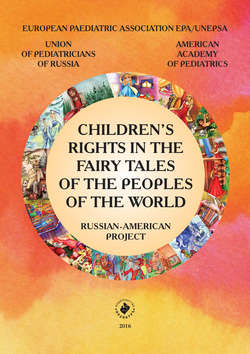Читать книгу Children’s rights in the fairy tales of the peoples of the world. Russian-American project - Коллектив авторов - Страница 10
На сайте Литреса книга снята с продажи.
Part I
Hans Christian Andersen. The Little Mermaid
ОглавлениеThe king of the sea had six daughters. All of them were beautiful, especially the youngest one. She had blue eyes like a lake, a soft skin like rose-petals, but she had a fish-like tale instead of legs. The little mermaid was as dreamy as her sisters. She liked to watch the orange sun through the thickness of the water. She was waiting for her fifteenth birthday to go up to the surface and to see the world that she was interested in her desperately. Finally, that day had come. She went up to the surface, took a sit at a big rock and looked around at the human's world. Far away she saw a ship. She could hear music and singing from the deck. She swam closer and saw a very handsome young man and fell in love with him at once. Soon a storm began, the ship couldn't stand up to the heavy waves and crashed.
All the sailors drowned, but the little Mermaid managed to save her prince. She carried him carefully to the shore.
Having returned to her father's kingdom, into the deepness of the sea, the little Mermaid became even more sad and thoughtful. She was missing her prince. At last she decided to become his fiancée. The Sea Witch boiled a potion for the little mermaid. It would transform her fish-like tale into two little white legs. But in exchange for it the witch took her beautiful voice, and the little Mermaid, who was singing so nicely, became dumb.
The prince met her at the shore. The little mermaid desperately wanted him to love her. Every evening she danced on her new legs, which made her suffer very much. Meanwhile, the prince, who received her so kindly, confessed, that he loved another woman. Her prince was going to get married, and she would die from grief. The little mermaid's sisters were very sorry for her. They gave her a knife, so she could kill the prince and become a mermaid again. But she threw out the knife, plunged into the sea and felt her body flow like foam. And so she turned into sea foam. This is the destiny of all mermaids.
Article 9.
1. States Parties shall ensure that a child shall not be separated from his or her parents against their will, except when competent authorities subject to judicial review determine, in accordance with applicable law and procedures, that such separation is necessary for the best interests of the child. Such determination may be necessary in a particular case such as one involving abuse or neglect of the child by the parents, or one where the parents are living separately and a decision must be made as to the child's place of residence.
2. In any proceedings pursuant to paragraph 1 of the present article, all interested parties shall be given an opportunity to participate in the proceedings and make their views known.
3. States Parties shall respect the right of the child who is separated from one or both parents to maintain personal relations and direct contact with both parents on a regular basis, except if it is contrary to the child's best interests.
4. Where such separation results from any action initiated by a State Party, such as the detention, imprisonment, exile, deportation or death (including death arising from any cause while the person is in the custody of the State) of one or both parents or of the child, that State Party shall, upon request, provide the parents, the child or, if appropriate, another member of the family with the essential information concerning the whereabouts of the absent member(s) of the family unless the provision of the information would be detrimental to the well-being of the child. States Parties shall further ensure that the submission of such a request shall of itself entaile no adverse consequences for the person(s) concerned.
Article 21. States Parties that recognize and/or permit the system of adoption shall ensure that the best interests of the child shall be the paramount consideration and they shall:
(a) Ensure that the adoption of a child is authorized only by competent authorities who determine, in accordance with applicable law and procedures and on the basis of all pertinent and reliable information, that the adoption is permissible in view of the child's status concerning parents, relatives and legal guardians and that, if required, the persons concerned have given their informed consent to the adoption on the basis of such counselling as may be necessary;
(b) Recognize that inter-country adoption may be considered as an alternative means of child's care, if the child cannot be placed in a foster or an adoptive family or cannot in any suitable manner be cared for in the child's country of origin;
(c) Ensure that the child concerned by inter-country adoption enjoys safeguards and standards equivalent to those existing in the case of national adoption;
(d) Take all appropriate measures to ensure that, in inter-country adoption, the placement does not result in improper financial gain for those involved in it;
(e) Promote, where appropriate, the objectives of the present article by concluding bilateral or multilateral arrangements or agreements, and endeavour, within this framework, to ensure that the placement of the child in another country is carried out by competent authorities or organs.
THE CHILD HAS THE RIGHT NOT TO BE SEPARATED FROM HIS OR HER PARENTS
